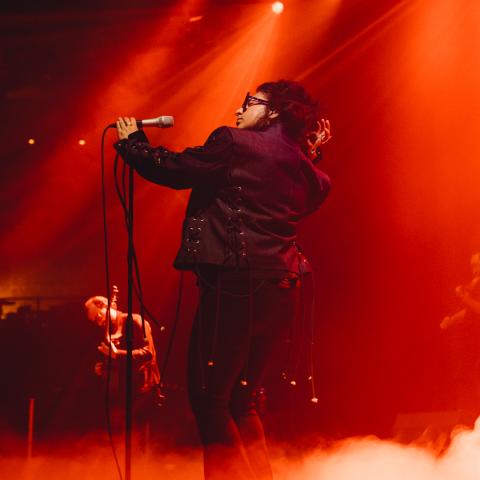Faculty Profile: Rob Rose

Rob Rose
When Rob Rose '72 was 11 years old, his older brother attended Berklee's seven-week summer program as a drummer. The older Rose returned home telling Rob, "It's so cool, you have to go there too." While college was clearly not yet on the junior Rose's radar, events throughout his teen years would combine to make Berklee the clear choice for his music education and later, the locus of his career. For Rose, who was recently promoted to the position of vice president of special programs, 2012 marks his 40th year of service to the college.
Rose began playing saxophone by default; his parents couldn't afford to buy him a trumpet. Noting the interest Rose had in music, the band director at his school in Hopedale, MA, loaned him a C melody saxophone to get him started. Rose took lessons with the late Boots Mussulli, a highly regarded saxophonist in the Boston jazz scene during the 1940s and 1950s. Mussulli also started bringing Rose to concerts at the Crystal Room in nearby Milford, MA, where many top jazz artists and big bands played between bookings in Boston and Worcester.
At the time, Rose also worked frequently with his father, who catered events at the Lakeview Ballroom in Mendon. On one memorable night when Rose and his girlfriend Jodie (now his wife of 43 years) were working with his father on a catering job at the Lakeview Ballroom, Duke Ellington was booked to play. The legendary bandleader showed up alone to set up his gear. "My father told us, 'Go help him get the equipment in,'" Rose recalls. "That was a dream come true for me, because Duke was one of my idols back then." Rose-who was 15 at the time-got to spend four hours with the affable Ellington before the performance.
Three of Rose's brothers were active in music, and he tagged along to his older brother's gigs with a local country group that often backed artists from Nashville, including Johnny Cash and others. He also played keyboards in local rock bands with his younger brother opening shows for the Yardbirds and other sixties headliners. Experiences with rock bands, the Milford Youth Orchestra, and watching a range of pro shows, fostered Rose's openness to a range of musical styles. This multihued musical palette has benefited him as well as two generations of Berklee students.
"Rose enrolled at Berklee in 1967 as a composition major, and after graduation, stayed on for what he thought would be a short-term teaching position in the Instrumental Performance Department with late faculty member John LaPorta. "John was an amazing guy," says Rose. "I learned so much working with him in the first four months. John had a special way of helping students develop their own voices-not an easy thing to do. We became good friends and I stayed on."
Championing Musical Diversity
Rose later became a key advocate for incorporating popular music into the Berklee curriculum. Lawrence Berk, the college's founder, was always open to suggestions from faculty members and welcomed Rose's ideas for embracing pop and rock styles. Rose developed courses such as Rock Arranging for the Recording Studio, Rock Arranging for Live Performance, Jazz Rock Improvisation, Improvisation in the Latin Jazz Idiom, and more. In 1974, he established the Berklee Jazz-Rock Ensemble and Pop-Rock Recording Ensembles.
"The idea for those groups was to give the students a chance to experiment and combine jazz, rock, Latin, or whatever styles of music they wanted," he says. "Those were the days before there was a vocal department, and we started featuring singers in the concerts. It sort of snowballed from there." In 1978 the Berklee Jazz-Rock Ensemble began presenting tribute concerts to acts like the Beatles, James Brown, and Motown artists. During the early 1980s, Rose inaugurated an annual country music concert.
In 1983, Larry Monroe, the dean of the Performance Division at the time, asked Rose to chair the Performance Studies Department. In this new position, Rose became more involved in producing the college's major concert events. "Larry was looking for more performance opportunities for vocalists, so we began the Singers Showcase concerts in the fall of 1983," Rose says. "It quickly became a very popular show every fall and spring. The original idea was to give the singers a chance to work with the best student instrumentalists and writers. We also wanted them to learn about auditioning. The audition process for those shows is pretty rigorous. Paula Cole, Susan Tedeschi, Lalah and Kenya Hathaway, and others featured in Singers Showcase concerts went on to high-profile careers."
Rose and his Yo Team production staff (with faculty members Ken Zambello, Donna McElroy, and Tom Stein as the core), are the prime movers behind the annual commencement and convocation concerts, Singers Showcase, International Night, the Berklee Beantown Jazz Festival, the Encore Gala, and more. These large-scale events also employ hundreds of students who learn about all aspects of concert production.
When Rose was named Assistant Vice President for Special Programs in 1993, he oversaw all of Berklee's concert venues, video services, and summer programs. The latter includes such offerings as Guitar Sessions, the new Mark O'Connor Berklee College of Music String Program, and the Five-Week Summer Performance Program.
Rose's new position as vice president of special programs brings with it membership in the president's cabinet, the executive committee that handles important decisions for the college.
"Berklee has always been a very special place, to me," says Rose. "It's a haven for musicians who want to experiment. Every facet of the music industry is covered here. That's one of the things I love most about Berklee. I never wanted a career where I'd become stagnant, and I've found that that can never happen here."




